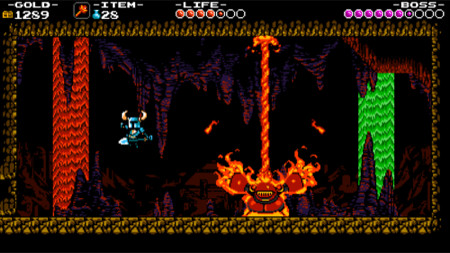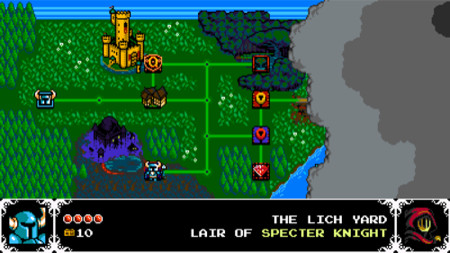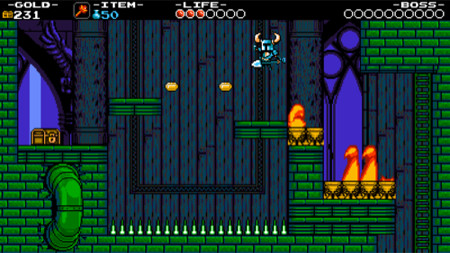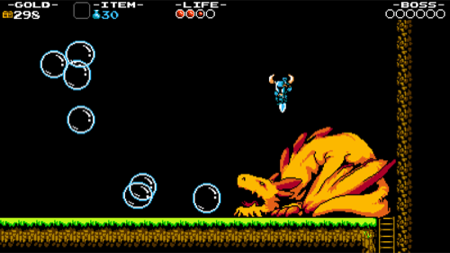Game Review
by Dave Riley,Shovel Knight
3DS, WiiU, PC
| Description: | 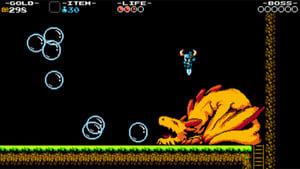 |
||
Shovel Knight is a Mega Man-styled retro platformer with NES aesthetics, tight mechanics, and an excess of heart. |
|||
| Review: | |||
Shovel Knight is a retro-style platformer, mostly Mega Man in feel, about a knight who digs dirt and bashes bad guys with a shovel. Despite the silliness of the concept, his weapon being a shovel isn't an excuse to wink at the camera. This game plays it straight. Each level begins with a stoic phrase like "--Sharpen Thy Shovel--" A town denizen challenges Shovel Knight's legendary status, and then explodes with glee when Shovel Knight proves his mettle by shoveling away a nearby dirt pile. Shovel Knight gets it. It knows that it's more fun to exult in the goofiness of past games than to poke fun, and act like you're better-than. The Shovel Knight's foes, The Enchantress and her Order of No Quarter, are made up of evil beings like Specter Knight, a scythe-wielding Grim Reaper stand-in, and Polar Knight, a gargantuan Shovel Knight antipode who wallops you with a snow shovel, but all are treated with the same level of sincerity. If Mega Man's Dust Man, Pharaoh Man, or Jewel Man were suddenly given voice, one hopes they'd refer to their absurd professions with the same gravitas used by Mole Knight, Propeller Knight, and King Knight.
You'll recognize bits and pieces from half a dozen NES classics--Zelda's potions, Castlevania's subweapons, Mario 3's world map--but the closest analog is Mega Man 9. Shovel Knight's spike and pit-filled stages require platforming proficiency, the game doesn't bend over backwards to ensure the player sees the next level, but its difficulty is moderated by a fairness and consistency often missing from early Nintendo games. Unlike many indie titles with retro aspirations, there's no hint of maso-core here. Like classic Mega Man, the platforming always gives you a safe space to test out a new trick. Disappearing blocks show up in a room without pits, then in a room with pits, then in a room with pits and intermittent lava flows. The game teaches you through doing, not tutorial. Instead of gating your progress with limited lives, Shovel Knight drops some of your cash in the field when you die. Risking a third of your money every time you mistime a jump does amp up the stress, but checkpoints are common, especially during difficult stages. In the moment things can be pretty tense, but you'll never see a Game Over screen, and you usually respawn less than three or four screens away from the thousand bucks you lost. If that feels too easy, checkpoints can be smashed for increased challenge, and a bit of extra cash.
Not that you'll really need it. A handful of weapon and armor upgrades wait in a town discovered halfway through the game. None of them are mandatory, and most armor powers (you can only have one equipped) pale in comparison to the one that auto-charges your shovel swing after you land two consecutive pogo jumps. You'll probably have enough by the end to max out your life bar and buy your charge attacks, even if you spend the last half of the game tumbling into pit after pit. If you end up a bit short there's a menagerie of world map-roaming monsters who throw you into auto-scrolling levels replete with treasure or optional boss battles against hulking Belmont-likes and your shovel-wielding nemesis, the Black Knight. By default you can swing, and you can pogo; relics govern everything else. Mostly it's straightforward stuff like the anchor, an arc-thrown Castlevania axe. A few items, like a broach of temporary invincibly and an air dash, give alternatives to solving spike rooms and bottomless gorges without having to beat your head against the traps. Everything else--the gauntlet that charge-punches, the screen-clearing horn--are more like fun quirks you can deploy when you want to try something different.
Shovel Knight's short attack range requires he weave in and out of melee. Combat is always busy, especially when it's done in pitch-black rooms amid pits and spikes. The game doesn't really want for any more depth, but, by the same token, it rarely requires anything beyond the basic skillset. There's nothing that feels like a final exam. The last few levels call to mind the Wily's Castles of Mega Mans past, but without the grueling ladder climbs over yawning abysses and without the seemingly unkillable bosses. There are moments of intensity throughout the final stages, but nothing as as maddening as a Yellow Devil or a Mecha Dragon, nothing that will make you chuck a controller across the room and punch the power button. Still, does this game need an ultimate test of prowess? There's no time to think "well, this could be harder" while you're whacking floating, rainbow-spewing gargoyle statues to traverse rooms more chasm than floor or navigating darkened castle parapets where only the rain differentiates real blocks from illusory ones. There is a familiar sense of motion, an excitement in of charging from challenge to challenge, finding a difficult room, then finding a way to surmount it, your enthusiasm propelled by a chirpy, chiptune-y soundtrack. There is never any filler. This is a game that keeps you moving, one that urges you to never stop, to never think, because thinking is what gets you dropped into pits or riddled with fireballs. Shovel Knight is not a thoughtless pastiche. Where other games ape a Nintendo look and claim retro, this one uses twenty years of new technology to make something that feels like it could've actually been, if we'd just given the NES a few more years. It exudes charm without even trying while other games fall all over themselves, desperate to keep your interest even for a second. During the game's most intense jumps, its hyper-speediest bosses, you'll grip the controller as hard as you did during any Mega Man or Castlevania.
Yet, Shovel Knight is its own. References to the classics are there, but they are never in your face, and they are never so prevalent that what was great about games of the past overwrites what is great about the game you're playing right now. Its world is wonderful, its levels challenging, and its humor genuine, but, in the end, what's most surprising is the game's emotional core. Shovel Knight's quest is to liberate his sister in arms, Shield Knight--sort of a Proto Man for the Shovel generation. In dreams he watches her fall, compelled by that blocky text to "--Catch Her--" while infinite enemies spawn and harass him. These quiet, subtle moments between levels rife with chunky block puzzles and pingy music display the heart of Shovel Knight, a game whose phenomenal passion for the old mixes perfectly with its drive to create something new. |
|
The views and opinions expressed in this article are solely those of the author(s) and do not necessarily represent the views of Anime News Network, its employees, owners, or sponsors.
|
| Grade: | |||
Overall : A-
Graphics : A-
Sound/Music : A
Gameplay : B+
Presentation : A-
+ High fidelity classic feel, great soundtrack, excellent Mega Man sensibilities, relentlessly charming |
|||
| discuss this in the forum (4 posts) | | |||
